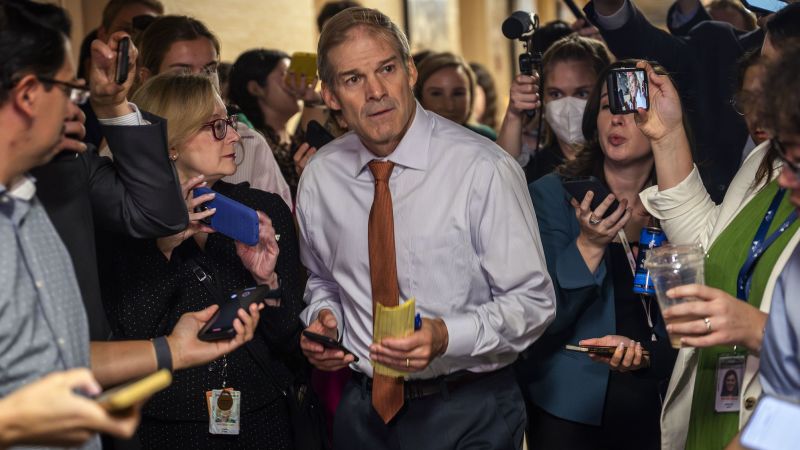The Justice Department has directed an FBI special agent not to testify before the Republican-led House Judiciary Committee in a dispute over the agent’s request to have both his personal lawyer and a Justice Department attorney present during his deposition, a source familiar with the matter tells CNN.
In a letter obtained exclusively by CNN, the department on Wednesday accused the Republican-led committee of “needless escalation” of a routine matter, as the Biden administration and House Judiciary Chair Jim Jordan, a Republican, battle over GOP claims that the FBI played a role in social media suppressing a story about Hunter Biden’s laptop in 2020.
At issue is whether Elvis Chan, an FBI special agent whose work focuses on cybersecurity and foreign influence on social media, can be forced to be deposed before Congress without being accompanied by both a Justice Department attorney and his personal lawyer.
This is the first time since Republicans took over the House this year that DOJ has directed an employee not to appear before Congress under subpoena, opening the door for the committee to move forward with holding Chan in contempt of Congress.
“Everything is on the table for Mr. Chan, including contempt,” Judiciary spokesperson Russell Dye told CNN.
In its letter to the committee, DOJ argues that under the law, government employees are allowed to be accompanied by agency attorneys during a congressional deposition. The letter says that Chan would not cooperate with the panel’s subpoena unless a DOJ attorney is allowed to accompany him along with his personal attorney.
But the Republican-led committee claims that under House rules, Chan cannot have both counsels present for a deposition. A line included in House Judiciary rules stipulates that a witness may be “accompanied at a deposition by two designated personal, nongovernmental attorneys to advise them of their rights.”
That rule contradicts a 2019 legal memo from the Justice Department’s Office of Legal Counsel stating that Congress may not constitutionally prohibit agency counsel from accompanying agency employees called to testify about matters that potentially involve information protected by executive privilege.
The dispute could set up a separation of powers standoff over which takes precedent – House rules or Justice Department legal opinion.
Chan is the first DOJ witness trying to bring both agency and personal counsel to an interview under this Congress, but there are many examples of this happening in the last Congress when the House was under Democratic control, two sources familiar with the matter tell CNN.
“Nobody who has ever been subpoenaed who requested agency counsel has ever been denied agency counsel,” a senior Democratic aide familiar with congressional investigations told CNN.
Jordan has wanted to speak to Chan for months as part of House Republicans’ investigations of what they claim is government-ordered censorship, including allegations that Chan told Twitter to block users from sharing a 2020 New York Post story containing material from a laptop belonging to Hunter Biden.
The DOJ and the Republican-led Judiciary Committee have been going back and forth for months over securing Chan’s testimony. Chan was supposed to appear voluntarily before the committee on September 15. But when the panel found out Chan was planning to bring both his agency and personal counsel, the interview fell apart and the committee promptly issued a subpoena.
Larry Berger, an attorney representing Chan, says that his client has from the beginning requested that two attorneys be present during his interview – a private attorney to represent his personal interests and an agency counsel to represent the interests of the Justice Department and the FBI.
“There is no reason in logic or law that allows the committee to refuse his personal choice,” Berger told CNN. “This is an utterly arbitrary decision without basis in law or rule.”
Berger has represented federal agents in dozens of interviews over the years with congressional committees and says Chan’s request is standard and it has never been an issue for other witnesses in congressional investigations.
“Mr. Chan remains ready, willing and able to show up on a voluntary basis to provide the information they want,” Berger added. “We respect the role of Congress but they shouldn’t be interfering with choice of counsel.”
Despite telling Chan not to show up for Thursday’s deposition, the Justice Department stated in its October 3 letter that it will still make Chan available to testify voluntarily with his agency and personal counsel present.
In February, former Twitter executives acknowledged to lawmakers that the social media company erred when it temporarily suppressed a New York Post story regarding Hunter Biden’s laptop in October 2020, but the officials emphasized there was no government involvement in the decision
A CNN investigation last year found no evidence that the FBI explicitly told Twitter to suppress the story. In fact, the opposite view emerged from sworn testimony given by Chan. And in interviews with CNN, half a dozen tech executives and senior staff, along with multiple federal officials familiar with the matter, all denied any such directive was given.
In its October 3 letter, DOJ argued that a congressional subpoena pertaining to a government employee’s official duties “cannot constitutionally be enforced” without the presence of agency counsel.
In the letter, DOJ Assistant Attorney General Carlos Felipe Uriarte added that “the underlying principles that inform the Department’s position are longstanding across administrations. Every other Department employee who has appeared before the Committee during this Congress has appeared with agency counsel.”
In his subpoena letter to Chan last month, Jordan contended, “the Constitution affords the House the authority to determine its own rules and procedures.”
The committee argued that its interest in Chan deviates from agency interests, and that having agency counsel could hinder the interview.
“The Committee has information that suggests you were not fully candid in your sworn deposition in federal litigation—a deposition during which you were represented by Department counsel and a matter in which you face personal liability in a manner that departs from the FBI’s and Department’s institutional interests,” Jordan wrote in his subpoena letter.
Read the full article here





